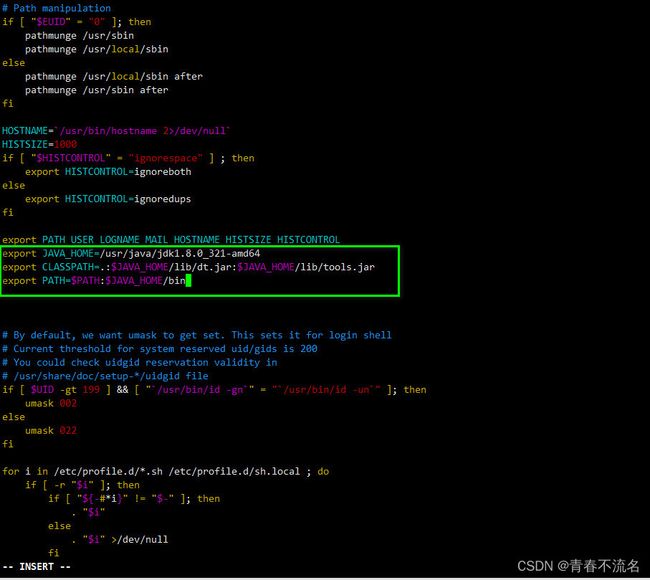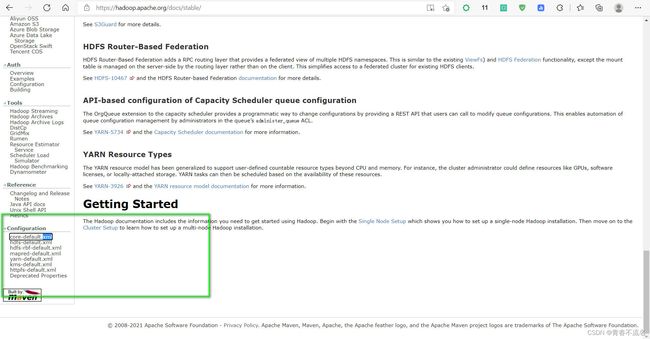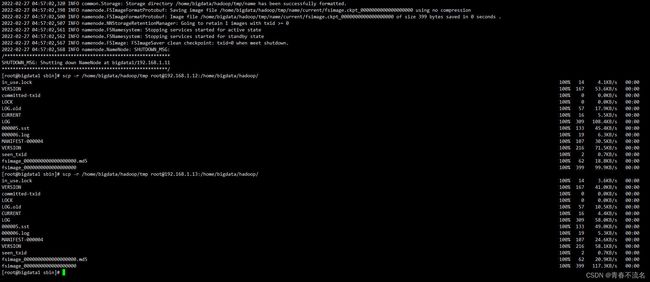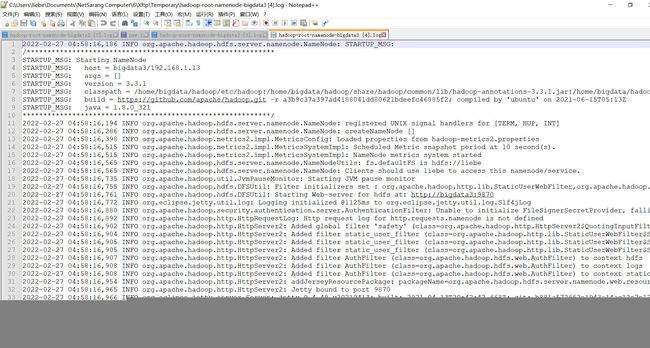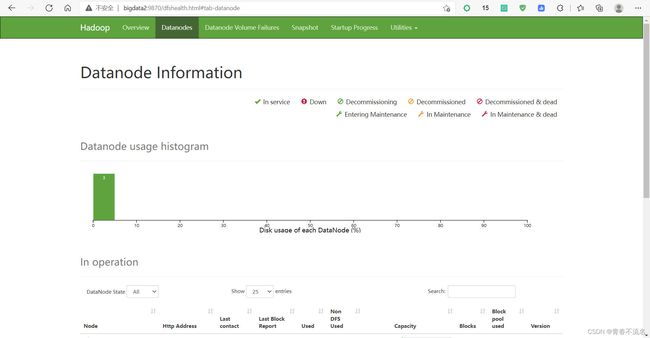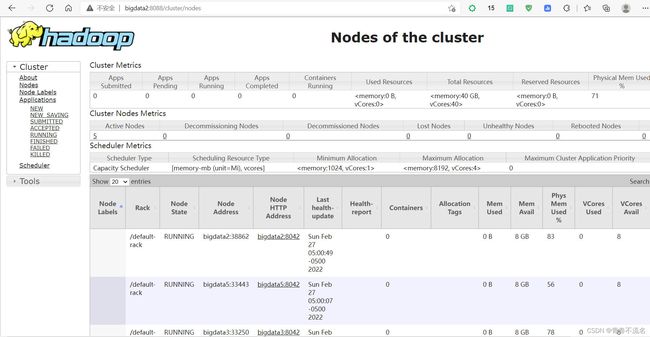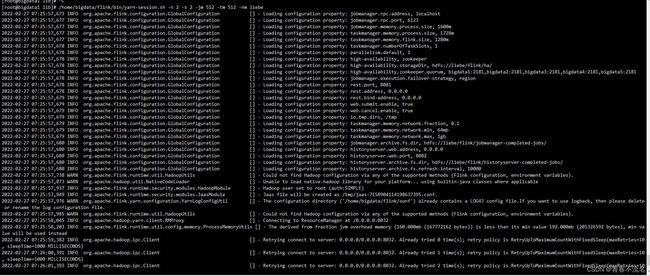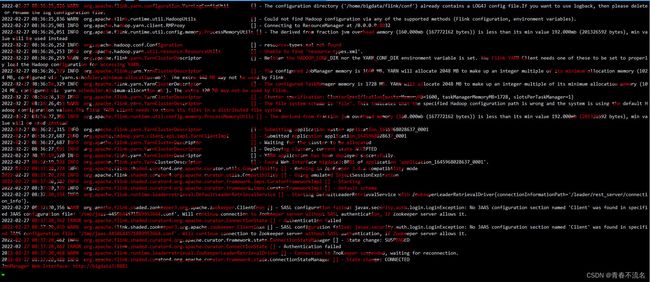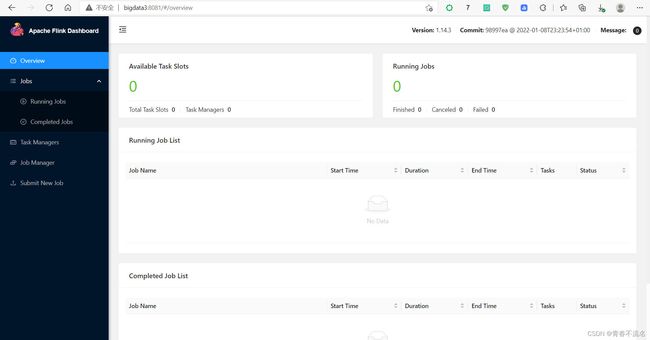centos安装hadoop环境(编写中)
一、环境准备
服务集群机器
描述:使用Oracle VM VirtualBox搭建部署的五台虚拟机,使用系统Centos(2009)
192.168.1.11 bigdata1
192.168.1.12 bigdata2
192.168.1.13 bigdata3
192.168.1.14 bigdata4
192.168.1.15 bigdata5
ssh免登录的设置
在每台机器上分别执行ssh-keygen -t rsa,一直按住回车键。
在bigdata 192.168.1.11的机器上进行公钥的追加操作 cat ~/.ssh/id_rsa.pub >> ~/.ssh/authorized_keys
将其他机器上生成的公钥拷贝到192.168.1.11的~/.ssh目录,生成id_rsa.pub12至15的文件
scp -r ~/.ssh/id_rsa.pub [email protected]:~/.ssh/id_rsa.pub12
scp -r ~/.ssh/id_rsa.pub [email protected]:~/.ssh/id_rsa.pub13
scp -r ~/.ssh/id_rsa.pub [email protected]:~/.ssh/id_rsa.pub14
scp -r ~/.ssh/id_rsa.pub [email protected]:~/.ssh/id_rsa.pub15
执行上面命令后在bigdata1的~/.ssh目录下ls,可看到如下文件![]()
把相关文件追加到authorized_keys后,再进行分发。
cat id_rsa.pub12 >> authorized_keys
cat id_rsa.pub13 >> authorized_keys
cat id_rsa.pub14 >> authorized_keys
cat id_rsa.pub15 >> authorized_keys
chmod 600 authorized_keys (设置读写的权限)
进行分发的操作
scp -r ~/.ssh/authorized_keys [email protected]:~/.ssh
scp -r ~/.ssh/authorized_keys [email protected]:~/.ssh
scp -r ~/.ssh/authorized_keys [email protected]:~/.ssh
scp -r ~/.ssh/authorized_keys [email protected]:~/.ssh
为每台机器设置 /etc/hosts配置
127.0.0.1 localhost localhost.localdomain localhost4 localhost4.localdomain4
::1 localhost localhost.localdomain localhost6 localhost6.localdomain6
192.168.1.11 bigdata1
192.168.1.12 bigdata2
192.168.1.13 bigdata3
192.168.1.14 bigdata4
192.168.1.15 bigdata5
二、安装部署
安装JDK环境
每台机器上安装JDK环境,JDK的版本是jdk8
rpm -ivh jdk-8u321-linux-x64.rpm
配置环境变量
在每台机器上执行vim /etc/profile
export JAVA_HOME=/usr/java/jdk1.8.0_321-amd64
export CLASSPATH=.:$JAVA_HOME/lib/dt.jar:$JAVA_HOME/lib/tools.jar
export PATH=$PATH:$JAVA_HOME/bin
使配置生效
source /etc/profile
三、安装zookeeper集群
安装目录 /home/bigdata
下载Zookeeper并安装配置
复制配置文件
cp -r /home/bigdata/zookeeper/conf/zoo_sample.cfg /home/bigdata/zookeeper/conf/zoo.cfg
zoo.cfg的内容
# The number of milliseconds of each tick
tickTime=2000
# The number of ticks that the initial
# synchronization phase can take
initLimit=10
# The number of ticks that can pass between
# sending a request and getting an acknowledgement
syncLimit=5
# the directory where the snapshot is stored.
# do not use /tmp for storage, /tmp here is just
# example sakes.
dataDir=/home/bigdata/zookeeper/data
dataLogDir=/home/bigdata/zookeeper/logs
# the port at which the clients will connect
clientPort=2181
# the maximum number of client connections.
# increase this if you need to handle more clients
maxClientCnxns=100
#
# Be sure to read the maintenance section of the
# administrator guide before turning on autopurge.
#
# http://zookeeper.apache.org/doc/current/zookeeperAdmin.html#sc_maintenance
#
# The number of snapshots to retain in dataDir
autopurge.snapRetainCount=3
# Purge task interval in hours
# Set to "0" to disable auto purge feature
autopurge.purgeInterval=1
server.1=192.168.1.11:2888:3888
server.2=192.168.1.12:2888:3888
server.3=192.168.1.12:2888:3888
server.4=192.168.1.14:2888:3888
server.5=192.168.1.15:2888:3888
## Metrics Providers
#
# https://prometheus.io Metrics Exporter
#metricsProvider.className=org.apache.zookeeper.metrics.prometheus.PrometheusMetricsProvider
#metricsProvider.httpPort=7000
#metricsProvider.exportJvmInfo=true
将整理好的zookeeper目录进行分发
scp -r /home/bigdata/zookeeper/ [email protected]:/home/bigdata/
scp -r /home/bigdata/zookeeper/ [email protected]:/home/bigdata/
scp -r /home/bigdata/zookeeper/ [email protected]:/home/bigdata/
scp -r /home/bigdata/zookeeper/ [email protected]:/home/bigdata/
为每台机器分别设置myid值
echo "1" > /home/bigdata/zookeeper/data/myid
echo "2" > /home/bigdata/zookeeper/data/myid
echo "3" > /home/bigdata/zookeeper/data/myid
echo "4" > /home/bigdata/zookeeper/data/myid
echo "5" > /home/bigdata/zookeeper/data/myid
设置zookeeper的环境变量,在/etc/profile中追加内容
export ZOOKEEPER=/home/bigdata/zookeeper
export PATH=$PATH:$JAVA_HOME/bin:$ZOOKEEPER/bin
启动zk的命令,在每台机器上执行
/home/bigdata/zookeeper/bin/zkServer.sh restart
/home/bigdata/zookeeper/bin/zkServer.sh stop
检查是否启动成功 ps -ef | grep zookeeper
输出下面的内容表示启动成功
四、安装hadoop环境
配置相关的环境变量,source /etc/profile
export YARN_NODEMANAGER_USER=root
export YARN_RESOURCEMANAGER_USER=root
export HDFS_DATANODE_USER=root
export HDFS_JOURNALNODE_USER=root
export HDFS_ZKFC_USER=root
export HDFS_NAMENODE_USER=root
export PATH USER LOGNAME MAIL HOSTNAME HISTSIZE HISTCONTROL
export JAVA_HOME=/usr/java/jdk1.8.0_321-amd64
export CLASSPATH=.:$JAVA_HOME/lib/dt.jar:$JAVA_HOME/lib/tools.jar
export ZOOKEEPER=/home/bigdata/zookeeper
export PATH=$PATH:$JAVA_HOME/bin:$ZOOKEEPER/bin
解压hadoop文件并重命名文件夹,使用最新的版本是3.3.1
tar -zxvf hadoop-3.3.1.tar.gz && mv hadoop-3.3.1 hadoop
官方XML配置文件的地址Hadoop – Apache Hadoop 3.3.1
core-site.xm
hdfs-site.xml
sshfence
shell(/bin/true)
yarn-site.xml
SPATH_PREPEND_DISTCACHE,HADOOP_YARN_HOME,HADOOP_MAPRED_HOME
workers
bigdata1
bigdata2
bigdata3
bigdata4
bigdata5
mapre-site.xml
vim /home/bigdata/hadoop/etc/hadoop/hadoop-env.sh
对bigdata1下/home/bigdata/hadoop文件夹进行分发操作
scp -r /home/bigdata/hadoop/ [email protected]:/home/bigdata
scp -r /home/bigdata/hadoop/ [email protected]:/home/bigdata
scp -r /home/bigdata/hadoop/ [email protected]:/home/bigdata
scp -r /home/bigdata/hadoop/ [email protected]:/home/bigdata
Hadoop集群的启动
/home/bigdata/hadoop/sbin/start-all.sh
启动完成,查看logs目录下的日志信息,出现错误,逐步排查解决。
使用验证
java.io.IOException: NameNode is not formatted.
rm -rf /home/bigdata/hadoop/tmp/data/*
rm -rf /home/bigdata/hadoop/tmp/name/*
rm -rf /home/bigdata/hadoop/tmp/jn/*
rm -rf /home/bigdata/hadoop/tmp/dfs/data/*
rm -rf /home/bigdata/hadoop/tmp/dfs/dn/*
rm -rf /home/bigdata/hadoop/tmp/dfs/name/*
rm -rf /home/bigdata/hadoop/tmp/dfs/jn/*
rm -rf /home/bigdata/hadoop/tmp/dfs/nn/*
/home/bigdata/hadoop/bin/hdfs namenode -format
五、部署spark
5.1、配置目录 ${spark_home}/conf
5.2、workers
node88
node89
node995.3、spark-env.sh
#!/usr/bin/env bash
#
# Licensed to the Apache Software Foundation (ASF) under one or more
# contributor license agreements. See the NOTICE file distributed with
# this work for additional information regarding copyright ownership.
# The ASF licenses this file to You under the Apache License, Version 2.0
# (the "License"); you may not use this file except in compliance with
# the License. You may obtain a copy of the License at
#
# http://www.apache.org/licenses/LICENSE-2.0
#
# Unless required by applicable law or agreed to in writing, software
# distributed under the License is distributed on an "AS IS" BASIS,
# WITHOUT WARRANTIES OR CONDITIONS OF ANY KIND, either express or implied.
# See the License for the specific language governing permissions and
# limitations under the License.
#
# This file is sourced when running various Spark programs.
# Copy it as spark-env.sh and edit that to configure Spark for your site.
export SPARK_HOME=/home/spark-3.3.0-bin-hadoop3
#locally模式
# Options read when launching programs locally with
# ./bin/run-example or ./bin/spark-submit
# - HADOOP_CONF_DIR, to point Spark towards Hadoop configuration files
# - SPARK_LOCAL_IP, to set the IP address Spark binds to on this node
# - SPARK_PUBLIC_DNS, to set the public dns name of the driver program
# Options read by executors and drivers running inside the cluster
# - SPARK_LOCAL_IP, to set the IP address Spark binds to on this node
# - SPARK_PUBLIC_DNS, to set the public DNS name of the driver program
# - SPARK_LOCAL_DIRS, storage directories to use on this node for shuffle and RDD data
# - MESOS_NATIVE_JAVA_LIBRARY, to point to your libmesos.so if you use Mesos
# Options read in any mode
export SPARK_CONF_DIR=${SPARK_HOME}/conf
export SPARK_EXECUTOR_CORES=1
export SPARK_EXECUTOR_MEMORY=1G
export SPARK_DRIVER_MEMORY=1G
# Options read in any cluster manager using HDFS
export HADOOP_CONF_DIR=/home/hadoop-3.3.4/etc/hadoop
# Options read in YARN client/cluster mode
export YARN_CONF_DIR=/home/hadoop-3.3.4/etc/hadoop
export SPARK_HISTORY_OPTS="
-Dspark.history.ui.port=18080
-Dspark.history.fs.logDirectory=hdfs://liebe/spark/history-eventLog
-Dspark.history.retainedApplications=30"
# Options for the daemons used in the standalone deploy mode
# - SPARK_MASTER_HOST, to bind the master to a different IP address or hostname
# - SPARK_MASTER_PORT / SPARK_MASTER_WEBUI_PORT, to use non-default ports for the master
# - SPARK_MASTER_OPTS, to set config properties only for the master (e.g. "-Dx=y")
# - SPARK_WORKER_CORES, to set the number of cores to use on this machine
# - SPARK_WORKER_MEMORY, to set how much total memory workers have to give executors (e.g. 1000m, 2g)
# - SPARK_WORKER_PORT / SPARK_WORKER_WEBUI_PORT, to use non-default ports for the worker
# - SPARK_WORKER_DIR, to set the working directory of worker processes
# - SPARK_WORKER_OPTS, to set config properties only for the worker (e.g. "-Dx=y")
# - SPARK_DAEMON_MEMORY, to allocate to the master, worker and history server themselves (default: 1g).
# - SPARK_HISTORY_OPTS, to set config properties only for the history server (e.g. "-Dx=y")
# - SPARK_SHUFFLE_OPTS, to set config properties only for the external shuffle service (e.g. "-Dx=y")
# - SPARK_DAEMON_JAVA_OPTS, to set config properties for all daemons (e.g. "-Dx=y")
# - SPARK_DAEMON_CLASSPATH, to set the classpath for all daemons
# - SPARK_PUBLIC_DNS, to set the public dns name of the master or workers
# Options for launcher
# - SPARK_LAUNCHER_OPTS, to set config properties and Java options for the launcher (e.g. "-Dx=y")
# Generic options for the daemons used in the standalone deploy mode
# - SPARK_CONF_DIR Alternate conf dir. (Default: ${SPARK_HOME}/conf)
# - SPARK_LOG_DIR Where log files are stored. (Default: ${SPARK_HOME}/logs)
# - SPARK_LOG_MAX_FILES Max log files of Spark daemons can rotate to. Default is 5.
# - SPARK_PID_DIR Where the pid file is stored. (Default: /tmp)
# - SPARK_IDENT_STRING A string representing this instance of spark. (Default: $USER)
# - SPARK_NICENESS The scheduling priority for daemons. (Default: 0)
# - SPARK_NO_DAEMONIZE Run the proposed command in the foreground. It will not output a PID file.
# Options for native BLAS, like Intel MKL, OpenBLAS, and so on.
# You might get better performance to enable these options if using native BLAS (see SPARK-21305).
# - MKL_NUM_THREADS=1 Disable multi-threading of Intel MKL
# - OPENBLAS_NUM_THREADS=1 Disable multi-threading of OpenBLAS
5.4、spark-defaults.conf
#
# Licensed to the Apache Software Foundation (ASF) under one or more
# contributor license agreements. See the NOTICE file distributed with
# this work for additional information regarding copyright ownership.
# The ASF licenses this file to You under the Apache License, Version 2.0
# (the "License"); you may not use this file except in compliance with
# the License. You may obtain a copy of the License at
#
# http://www.apache.org/licenses/LICENSE-2.0
#
# Unless required by applicable law or agreed to in writing, software
# distributed under the License is distributed on an "AS IS" BASIS,
# WITHOUT WARRANTIES OR CONDITIONS OF ANY KIND, either express or implied.
# See the License for the specific language governing permissions and
# limitations under the License.
#
# Default system properties included when running spark-submit.
# This is useful for setting default environmental settings.
# Example:
# spark.master spark://master:7077
spark.eventLog.enabled true
spark.eventLog.dir hdfs://liebe/spark
# spark.serializer org.apache.spark.serializer.KryoSerializer
# spark.driver.memory 5g
# spark.executor.extraJavaOptions -XX:+PrintGCDetails -Dkey=value -Dnumbers="one two three"
六、部署flink
安装Flink(flink-1.14.3-bin-scala_2.11.tgz)
flink-1.14.3-bin-scala_2.11.tgz hadoop tool zookeeper
上传安装包文件并进行解压重命名
需要相关jar文件(9条消息) flink-shaded-hadoop-3-uber-3.1.1.7.2.9.0-173-9.0.jar-Hadoop文档类资源-CSDN文库
(9条消息) commons-cli-1.5.0.jar-Java文档类资源-CSDN文库
FLINK的SESSION模式启动。
/home/bigdata/flink/bin/yarn-session.sh -n 2 -s 2 -jm 512 -tm 512 -nm liebe
配置文件flink.conf
################################################################################
# Licensed to the Apache Software Foundation (ASF) under one
# or more contributor license agreements. See the NOTICE file
# distributed with this work for additional information
# regarding copyright ownership. The ASF licenses this file
# to you under the Apache License, Version 2.0 (the
# "License"); you may not use this file except in compliance
# with the License. You may obtain a copy of the License at
#
# http://www.apache.org/licenses/LICENSE-2.0
#
# Unless required by applicable law or agreed to in writing, software
# distributed under the License is distributed on an "AS IS" BASIS,
# WITHOUT WARRANTIES OR CONDITIONS OF ANY KIND, either express or implied.
# See the License for the specific language governing permissions and
# limitations under the License.
################################################################################
#==============================================================================
# Common
#==============================================================================
# The external address of the host on which the JobManager runs and can be
# reached by the TaskManagers and any clients which want to connect. This setting
# is only used in Standalone mode and may be overwritten on the JobManager side
# by specifying the --host
# In high availability mode, if you use the bin/start-cluster.sh script and setup
# the conf/masters file, this will be taken care of automatically. Yarn
# automatically configure the host name based on the hostname of the node where the
# JobManager runs.
jobmanager.rpc.address: localhost
# The RPC port where the JobManager is reachable.
jobmanager.rpc.port: 6123
# The total process memory size for the JobManager.
#
# Note this accounts for all memory usage within the JobManager process, including JVM metaspace and other overhead.
jobmanager.memory.process.size: 1600m
# The total process memory size for the TaskManager.
#
# Note this accounts for all memory usage within the TaskManager process, including JVM metaspace and other overhead.
taskmanager.memory.process.size: 1728m
# To exclude JVM metaspace and overhead, please, use total Flink memory size instead of 'taskmanager.memory.process.size'.
# It is not recommended to set both 'taskmanager.memory.process.size' and Flink memory.
#
taskmanager.memory.flink.size: 1280m
# The number of task slots that each TaskManager offers. Each slot runs one parallel pipeline.
taskmanager.numberOfTaskSlots: 1
# The parallelism used for programs that did not specify and other parallelism.
parallelism.default: 1
# The default file system scheme and authority.
#
# By default file paths without scheme are interpreted relative to the local
# root file system 'file:///'. Use this to override the default and interpret
# relative paths relative to a different file system,
# for example 'hdfs://mynamenode:12345'
#
# fs.default-scheme
#==============================================================================
# High Availability 高可用的配置
#==============================================================================
# The high-availability mode. Possible options are 'NONE' or 'zookeeper'.
# 设置高可用模式,这里默认选用开启了zookeeper
high-availability: zookeeper
# The path where metadata for master recovery is persisted. While ZooKeeper stores
# the small ground truth for checkpoint and leader election, this location stores
# the larger objects, like persisted dataflow graphs.
#
# Must be a durable file system that is accessible from all nodes
# (like HDFS, S3, Ceph, nfs, ...)
# 设置文件系统的存储,这里使用的HDFS(必要的): JobManager 元数据持久化到文件系统 high-#availability.storageDir 配置的路径中,并且在 ZooKeeper 中只能有一个目录指向此位置。
high-availability.storageDir: hdfs://liebe/flink/ha/
# The list of ZooKeeper quorum peers that coordinate the high-availability
# setup. This must be a list of the form:
# "host1:clientPort,host2:clientPort,..." (default clientPort: 2181)
# (必要的): ZooKeeper quorum 是一个提供分布式协调服务的复制组。
high-availability.zookeeper.quorum: bigdata1:2181,bigdata2:2181,bigdata3:2181,bigdata4:2181,bigdata5:2181
每个 addressX:port 指的是一个 ZooKeeper 服务器,它可以被 Flink 在给定的地址和端口上访问。
high-availability.zookeeper.path.root (推荐的): ZooKeeper 根节点,集群的所有节点都放在该节点下。
high-availability.zookeeper.path.root: /flink
high-availability.cluster-id (推荐的): ZooKeeper cluster-id 节点,在该节点下放置集群所需的协调数据。
high-availability.cluster-id: /default_ns # important: customize per cluster
重要: 在 YARN、原生 Kubernetes 或其他集群管理器上运行时,不应该手动设置此值。在这些情况下,将自动生成一个集群 ID。如果在未使用集群管理器的机器上运行多个 Flink 高可用集群,则必须为每个集群手动配置单独的集群 ID(cluster-ids)。
# ACL options are based on https://zookeeper.apache.org/doc/r3.1.2/zookeeperProgrammers.html#sc_BuiltinACLSchemes
# It can be either "creator" (ZOO_CREATE_ALL_ACL) or "open" (ZOO_OPEN_ACL_UNSAFE)
# The default value is "open" and it can be changed to "creator" if ZK security is enabled
#
# high-availability.zookeeper.client.acl: open
#==============================================================================
# Fault tolerance and checkpointing
#==============================================================================
# The backend that will be used to store operator state checkpoints if
# checkpointing is enabled. Checkpointing is enabled when execution.checkpointing.interval > 0.
#
# Execution checkpointing related parameters. Please refer to CheckpointConfig and ExecutionCheckpointingOptions for more details.
#
# execution.checkpointing.interval: 3min
# execution.checkpointing.externalized-checkpoint-retention: [DELETE_ON_CANCELLATION, RETAIN_ON_CANCELLATION]
# execution.checkpointing.max-concurrent-checkpoints: 1
# execution.checkpointing.min-pause: 0
# execution.checkpointing.mode: [EXACTLY_ONCE, AT_LEAST_ONCE]
# execution.checkpointing.timeout: 10min
# execution.checkpointing.tolerable-failed-checkpoints: 0
# execution.checkpointing.unaligned: false
#
# Supported backends are 'jobmanager', 'filesystem', 'rocksdb', or the
#
#
# state.backend: filesystem
# Directory for checkpoints filesystem, when using any of the default bundled
# state backends.
#
# state.checkpoints.dir: hdfs://namenode-host:port/flink-checkpoints
# Default target directory for savepoints, optional.
#
# state.savepoints.dir: hdfs://namenode-host:port/flink-savepoints
# Flag to enable/disable incremental checkpoints for backends that
# support incremental checkpoints (like the RocksDB state backend).
#
# state.backend.incremental: false
# The failover strategy, i.e., how the job computation recovers from task failures.
# Only restart tasks that may have been affected by the task failure, which typically includes
# downstream tasks and potentially upstream tasks if their produced data is no longer available for consumption.
jobmanager.execution.failover-strategy: region
#==============================================================================
# Rest & web frontend
#==============================================================================
# The port to which the REST client connects to. If rest.bind-port has
# not been specified, then the server will bind to this port as well.
#
rest.port: 8081
# The address to which the REST client will connect to
#
rest.address: 0.0.0.0
# Port range for the REST and web server to bind to.
#
#rest.bind-port: 8080-8090
# The address that the REST & web server binds to
#
rest.bind-address: 0.0.0.0
# Flag to specify whether job submission is enabled from the web-based
# runtime monitor. Uncomment to disable.
web.submit.enable: true
# Flag to specify whether job cancellation is enabled from the web-based
# runtime monitor. Uncomment to disable.
web.cancel.enable: true
#==============================================================================
# Advanced
#==============================================================================
# Override the directories for temporary files. If not specified, the
# system-specific Java temporary directory (java.io.tmpdir property) is taken.
#
# For framework setups on Yarn, Flink will automatically pick up the
# containers' temp directories without any need for configuration.
#
# Add a delimited list for multiple directories, using the system directory
# delimiter (colon ':' on unix) or a comma, e.g.:
# /data1/tmp:/data2/tmp:/data3/tmp
#
# Note: Each directory entry is read from and written to by a different I/O
# thread. You can include the same directory multiple times in order to create
# multiple I/O threads against that directory. This is for example relevant for
# high-throughput RAIDs.
#
io.tmp.dirs: /tmp
# The classloading resolve order. Possible values are 'child-first' (Flink's default)
# and 'parent-first' (Java's default).
#
# Child first classloading allows users to use different dependency/library
# versions in their application than those in the classpath. Switching back
# to 'parent-first' may help with debugging dependency issues.
#
# classloader.resolve-order: child-first
# The amount of memory going to the network stack. These numbers usually need
# no tuning. Adjusting them may be necessary in case of an "Insufficient number
# of network buffers" error. The default min is 64MB, the default max is 1GB.
#
taskmanager.memory.network.fraction: 0.1
taskmanager.memory.network.min: 64mb
taskmanager.memory.network.max: 1gb
#==============================================================================
# Flink Cluster Security Configuration
#==============================================================================
# Kerberos authentication for various components - Hadoop, ZooKeeper, and connectors -
# may be enabled in four steps:
# 1. configure the local krb5.conf file
# 2. provide Kerberos credentials (either a keytab or a ticket cache w/ kinit)
# 3. make the credentials available to various JAAS login contexts
# 4. configure the connector to use JAAS/SASL
# The below configure how Kerberos credentials are provided. A keytab will be used instead of
# a ticket cache if the keytab path and principal are set.
# security.kerberos.login.use-ticket-cache: true
# security.kerberos.login.keytab: /path/to/kerberos/keytab
# security.kerberos.login.principal: flink-user
# The configuration below defines which JAAS login contexts
# security.kerberos.login.contexts: Client,KafkaClient
#==============================================================================
# ZK Security Configuration
#==============================================================================
# Below configurations are applicable if ZK ensemble is configured for security
# Override below configuration to provide custom ZK service name if configured
# zookeeper.sasl.service-name: zookeeper
# The configuration below must match one of the values set in "security.kerberos.login.contexts"
# zookeeper.sasl.login-context-name: Client
#==============================================================================
# HistoryServer
#==============================================================================
# The HistoryServer is started and stopped via bin/historyserver.sh (start|stop)
# Directory to upload completed jobs to. Add this directory to the list of
# monitored directories of the HistoryServer as well (see below).
jobmanager.archive.fs.dir: hdfs://liebe/flink/jobmanager-completed-jobs/
# The address under which the web-based HistoryServer listens.
historyserver.web.address: 0.0.0.0
# The port under which the web-based HistoryServer listens.
historyserver.web.port: 8082
# Comma separated list of directories to monitor for completed jobs.
historyserver.archive.fs.dir: hdfs://liebe/flink/historyserver-completed-jobs/
# Interval in milliseconds for refreshing the monitored directories.
historyserver.archive.fs.refresh-interval: 10000
rm -rf /home/bigdata/zookeeper/data/version-2/ /home/bigdata/zookeeper/data/zookeeper_server.pid
选择Resource是Active的的节点启动Yarn Session Flink
/home/bigdata/flink/bin/yarn-session.sh -n 2 -s 2 -jm 512 -tm 512 -nm liebe

